Wayfaring the BearWatch Project: Difference between revisions
| (288 intermediate revisions by 7 users not shown) | |||
| Line 1: | Line 1: | ||
<small>Estimated time to follow this cut without detours: 20 minutes. </small> | |||
The land invites one to move away from anthropocentric tellings - towards narrations of becoming knowledgeable in company with the seasons, snow, ice, wind, lichens, caribou and many more. Such stories leave room for us as researchers, but aren’t about us<ref>see Le Guin, U. K., & Haraway, D. J. (2019). The carrier bag theory of fiction (pp. 149-154). London: Ignota books. </ref>. | |||
[[File:Southampton Island.jpg|thumb|Spring on Southampton Island (Photograph taken by author in 2021)]] | |||
<small><references /></small> | |||
=Acknowledgements= | |||
An explicit note of acknowledgement for this cut goes out in particular to George Konana, in Gjoa Haven, and Leonard Netser in Coral Harbour. | |||
Both men have taken me out on the land, the sea and the ice on multiple occasions between 2020-2023. They patiently took time to introduce me to their land and explained how they found their way in various ways and under multiple conditions. | |||
[[File:Leonard Netser and George Konana.jpg|thumb|Leonard Netser (left) and George Konana (right) photographed by author]] | |||
Thank you for teaching me the valuable lesson of just tagging along and being present for the ride. | |||
=Becoming a Wayfarer= | |||
My name is Saskia de Wildt. This cut traces my PhD research as I have conducted it with-in a large Genome Canada funded research project: "BearWatch." | |||
Within my research I explore what it means to practice knowledge conciliation under guidance of the principles of the ‘Ethical Space of Engagement’<ref>Ermine, W. (2007). The ethical space of engagement. Indigenous Law Journal, 6(1), 193–203.</ref> and the Inuit Circumpolar Council (ICC) Protocols for Equitable and Ethical Engagement (EEE<ref>Inuit Circumpolar Council (2022). Circumpolar Inuit Protocols for Equitable and Ethical Engagement.</ref>) rather than based on data-driven needs. | |||
<div class="next_choice"> | |||
As you make your way through this knowledge-land-scape you might, depending on the choices you make, start feeling a shift from being a reader of my research, towards becoming a wayfarer alongside my research.</div> | |||
<small><references /></small> | |||
=Knowledge Conciliation in Polar Bear Research= | |||
Tensions around knowledge co-production in polar bear monitoring and co-management remain. | |||
Data-driven conservation, management and monitoring of polar bears in Inuit Nunangat- while necessary to address significant data gaps on population trends and a rapidly changing Arctic environment- has also proven itself a challenging environment for the conciliation of western sciences and Inuit Qaujimajatuqangit (IQ<ref>The Inuit specific cosmology of knowing and being in the world, see N. S. D. C. Nunavut Social Development Council. (1998). Report of the Nunavut Traditional Knowledge Conference, Igloolik, March 20-24,1998. Iqaluit: Nunavut Social Development Council. 35p.</ref>). | |||
<div class="next_choice">This cut explores the methodology of "wayfaring<ref>Ingold, T. (2010). Footprints through the weather‐world: walking, breathing, knowing. Journal of the Royal Anthropological Institute, 16, S121-S139.</ref>" as an ethical practice of knowledge conciliation. </div> | |||
<small><references /></small> | |||
=Wayfaring as a Sensitizing Method= | |||
My wayfaring approach, as will become clear, does not attempt to formulate a new, alternative, or innovative means of knowledge conciliation across cultural differences, nor does it lead to conclusive take-aways about ethical knowledge conciliation. | |||
[[File:PB skulls.jpg|thumb|Two polar bear skulls at George Konana's cabin.]] | |||
It instead unsettles fixed ideas about “knowledge” towards a “coming to know”, and instead of “knowledge integration” it performs the idea of “worldly encounters”. | |||
<div class="next_choice"> | |||
This cut centers the unfolding of a particular research project: ‘Bearwatch: Monitoring Impacts of Arctic Climate Change using Polar Bears, Genomics and Traditional Ecological Knowledge’. | |||
Hereafter referred to as "Bearwatch." | |||
'''"Keep going"''' to learn more </div> | |||
=The BearWatch Project= | |||
The BearWatch project ran between 2015 and 2023, during which it sought to meaningfully engage IQ in its development of a new non-invasive genomic polar bear monitoring toolkit. | |||
<div class="next_choice"> | |||
This cut is guided by excerpts of its project reports.</div> | |||
=Transdisciplinary Threading= | |||
The paths you will navigate alongside this project, interweave and correspond with that of mine, and with those of researchers and policymakers in the field of polar bear science, with polar bears themselves, community members, ice-pressure ridges, snowdrifts, silly hats and many more... | |||
<div class="next_choice"> | |||
But before you set on your way, notice that you have stumbled upon a "Vista". | |||
This '''"Vista"''' is a viewpoint. Go check it out!</div> | |||
<span class="pop-up vista link" data-page-title="The_ESE_(process)" data-section-id="0" data-encounter-type="Vista">[[The_ESE_(process)|Vista: The ESE]]</span> | |||
=Decision-making= | |||
You now have a choice to make. | |||
Will you trace the most straightforward path along the reports of BearWatch project? Or will you start threading your own path as you feel your way forward in response to the company you may encounter along the way? | |||
[[File:Invitation background.jpg|thumb]] | |||
<div class="next_choice">If you have not yet checked out the '''"Terms of Engagement"''' of this knowledge-land-scape, you should seek them out - find them on the bottom right corner of your screen. | |||
Otherwise, | |||
Take a '''"Detour"''' to look up the meaning of “intra” dependency, as opposed to “interdependency” before you keep going. | |||
Or, | |||
'''"Keep going"''' to keep following this cut instead.</div> | |||
<span class="detour to-cut-3 link" data-page-title="Intra-dependency" data-section-id="0" data-encounter-type="detour">[[intra-dependency|Detour: look up the meaning of "intra-dependency"]]</span> | |||
=TEK Workshops= | |||
From here, you jump straight into the BearWatch project- beginning with the TEK workshops that were held in the community of Gjoa Haven in 2019 as to inform a feasibility study on future community-driven polar bear fecal sample collection. | |||
The BearWatch project was designed to include a “Genomics and its Environmental, Economic, Ethical, Legal and Social aspects (GE3LS)” component | |||
Three TEK mapping workshops were co-designed with the HTA of Gjoa Haven, as part of the projects GE3LS strategy to ‘identify TEK gaps’ and ‘fill them’<ref>BearWatch research proposal, 2016 p.30-31</ref>. | |||
[[File:Mapping TEK Gjoa Haven 2019.jpg|thumb|Participants discussing during BearWatch TEK workshop 2019]] | |||
<div class="next_choice">You have taken a moment to sit down and read what Genome Canada has written on their website about GE3LS. | |||
Then someone brings up the existence of a nearby shipwreck: "Knowledge Co-production”. They suggest you go check it out to get a deeper understanding of the im/possibilities around bringing IQ together with western sciences. | |||
You weigh your options, | |||
'''"Keep going"''' to move on with the project. | |||
Or, | |||
'''"Detour"''', to read about GE3LS. | |||
Or, | |||
Check out the '''"Wrecksite"''' of "Knowledge Co-production"</div> | |||
<small><references /></small> | |||
[[ | <span class="detour to-cut-3 link" data-page-title="GE3Ls" data-section-id="0" data-encounter-type="detour">[[GE3Ls|Detour: Read more about GE3Ls]]</span> | ||
[[ | <span class="pop-up wrecksite link" data-page-title="Knowledge Co-production" data-section-id="0" data-encounter-type="wrecksite">[[Knowledge Co-production|Wrecksite: Knowledge Co-production]]</span> | ||
= | =Workshops Summer 2019= | ||
The Gjoa Haven Hunters and Trappers Association (HTA) doesn't want to "keep going," however. | |||
They have urgently been trying to get the BearWatch researchers to turn their focus towards the available polar bear harvest quota. | |||
After two generations of hardly being able to hunt polar bears, the Gjoa Haven HTA have asked the researchers of the BearWatch project to help them seek recognition for the loss of income, loss of culture, and loss of intergenerational knowledge transfer. | |||
[[File:Gjoa Haven's Appeal.mp3|thumb]] | |||
= | =Going on the Record= | ||
Two workshops were organized in response to community requests, to record the impacts of polar bear hunting quota reductions on the community. | |||
One workshop was held May 15, 2019 in the evening with 10 participants and one on May 16 in the morning with 11 participants. | |||
Both workshops were audio-recorded. | |||
The BearWatch PI's and Gjoa Haven HTA-board want to use these recordings as primary materials for an academic paper. | |||
They ask me to write it. However, I have just learnt about this project and have not yet set foot into the community. | |||
= | <div class="next_choice"> | ||
'''What would you do?''' | |||
'''"Stay with the Trouble"''' to explore how the “Politics of recognition” can complicate such writing- even if it risks completely derailing you from your course. | |||
Or, | |||
'''"Keep going"''' to not engage further with the community of Gjoa Haven for now, and prepare for your first fieldtrip to the North- to Coral Harbour. | |||
(The Gjoa Haven HTA wants a publication, so maybe there is no need to complicate things further for the moment?) | |||
</div> | |||
=== | <span class="pop-up stay-with-the-trouble link" data-page-title=" Politics_of_Recognition " data-encounter-type="Stay with the trouble">[[Politics of Recognition|Stay with the trouble: The Politics of Recognition]]</span> | ||
= | =Coral Harbour First Trip 2020= | ||
[[File:Coral Harbour May 2022.jpg|thumb|Photograph of Salliq (Photograph by author, May 2022)]] | |||
Alongside funding from Genome Canada, the project PI’s also successfully applied to the Crown-Indigenous Relations and Northern Affairs Canada/ World Wildlife Fund to fund ‘traditional knowledge research and a denning survey in Coral Harbour, Nunavut’ (Schedule H, 2020, March 31. This intended study included documenting polar bear TEK in Coral Harbour, surveys of vacated dens by locals to collect a variety of samples and data, and the initiation of a collaborative effort with the high school to train students in land-based surveys. | |||
= | <div class="next_choice">However, before you start, you hit an '''"Ice-Pressure Ridge"'''. The Covid virus has so rapidly spread, the World Health Organization declared it a pandemic on March 20, 2020.</div> | ||
<span class="redirective ice-pressure_ridge link" data-page-title="Covid-19" data-section-id="0" data-encounter-type="ice-pressure_ridge">[[Covid-19|Ice-pressure ridge: Immediately book a flight back]]</span> | |||
Latest revision as of 11:02, 18 July 2025
Estimated time to follow this cut without detours: 20 minutes.
The land invites one to move away from anthropocentric tellings - towards narrations of becoming knowledgeable in company with the seasons, snow, ice, wind, lichens, caribou and many more. Such stories leave room for us as researchers, but aren’t about us[1].
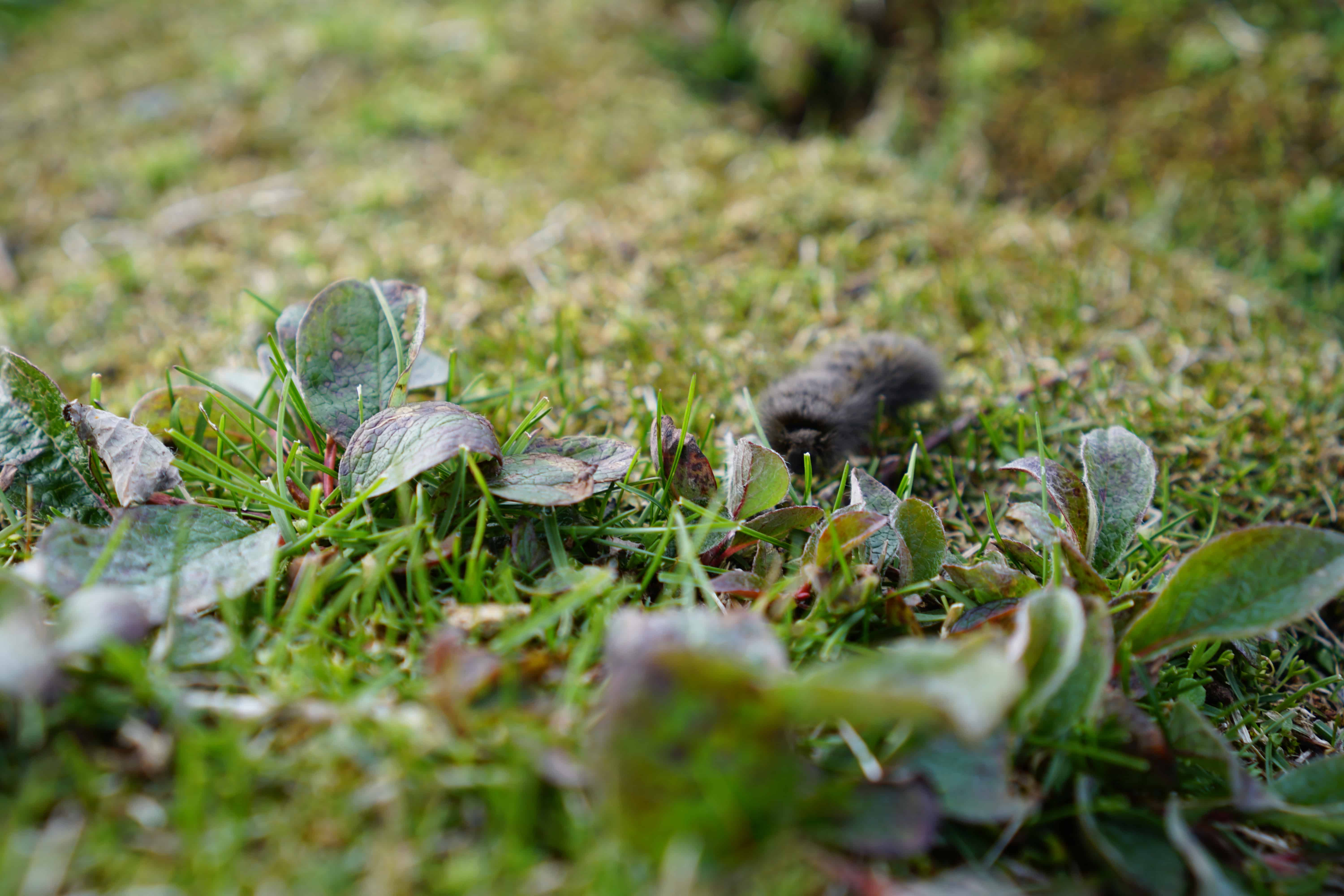
- ↑ see Le Guin, U. K., & Haraway, D. J. (2019). The carrier bag theory of fiction (pp. 149-154). London: Ignota books.
Acknowledgements[edit]
An explicit note of acknowledgement for this cut goes out in particular to George Konana, in Gjoa Haven, and Leonard Netser in Coral Harbour.
Both men have taken me out on the land, the sea and the ice on multiple occasions between 2020-2023. They patiently took time to introduce me to their land and explained how they found their way in various ways and under multiple conditions.
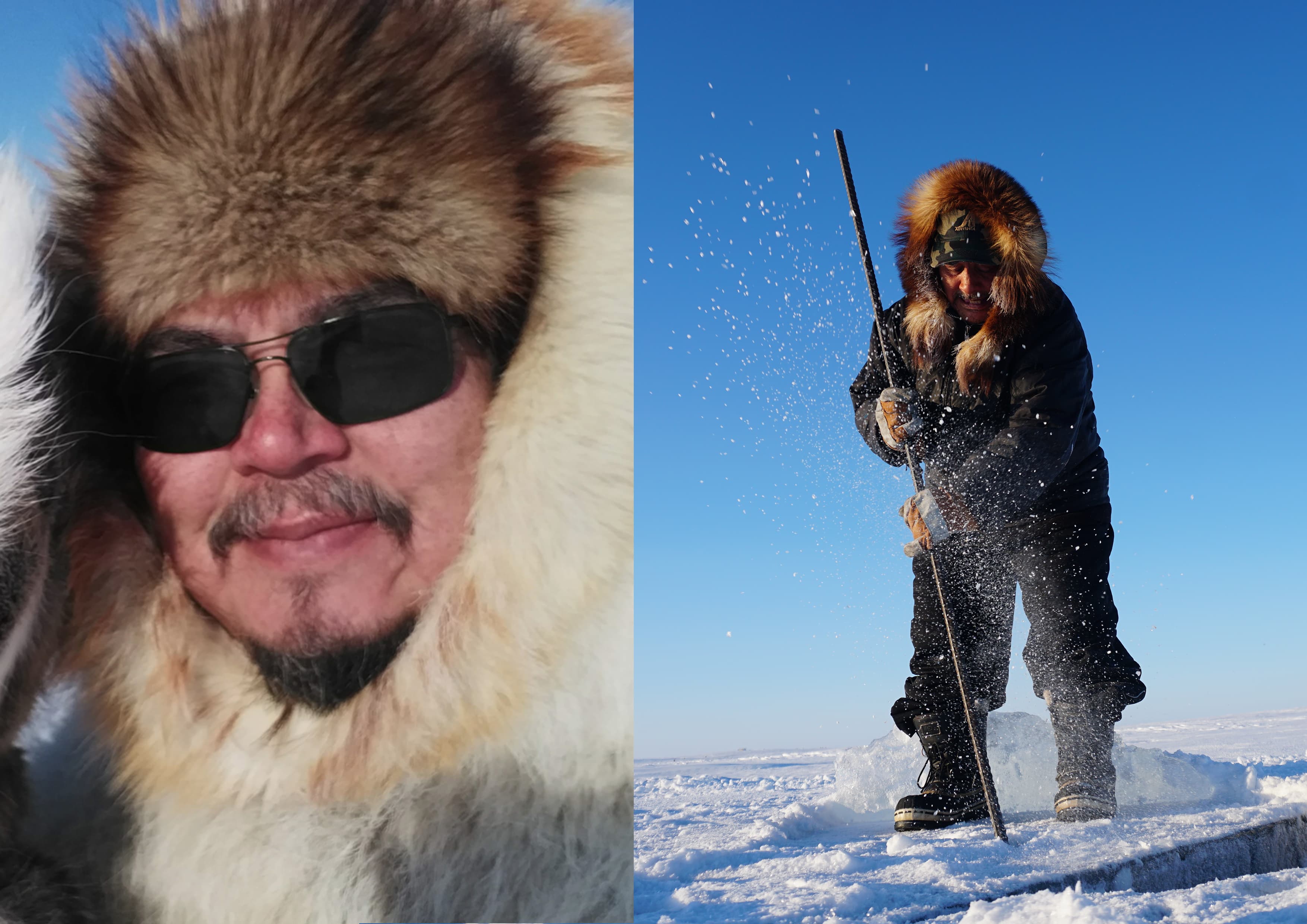
Thank you for teaching me the valuable lesson of just tagging along and being present for the ride.
Becoming a Wayfarer[edit]
My name is Saskia de Wildt. This cut traces my PhD research as I have conducted it with-in a large Genome Canada funded research project: "BearWatch."
Within my research I explore what it means to practice knowledge conciliation under guidance of the principles of the ‘Ethical Space of Engagement’[1] and the Inuit Circumpolar Council (ICC) Protocols for Equitable and Ethical Engagement (EEE[2]) rather than based on data-driven needs.
Knowledge Conciliation in Polar Bear Research[edit]
Tensions around knowledge co-production in polar bear monitoring and co-management remain.
Data-driven conservation, management and monitoring of polar bears in Inuit Nunangat- while necessary to address significant data gaps on population trends and a rapidly changing Arctic environment- has also proven itself a challenging environment for the conciliation of western sciences and Inuit Qaujimajatuqangit (IQ[1]).
- ↑ The Inuit specific cosmology of knowing and being in the world, see N. S. D. C. Nunavut Social Development Council. (1998). Report of the Nunavut Traditional Knowledge Conference, Igloolik, March 20-24,1998. Iqaluit: Nunavut Social Development Council. 35p.
- ↑ Ingold, T. (2010). Footprints through the weather‐world: walking, breathing, knowing. Journal of the Royal Anthropological Institute, 16, S121-S139.
Wayfaring as a Sensitizing Method[edit]
My wayfaring approach, as will become clear, does not attempt to formulate a new, alternative, or innovative means of knowledge conciliation across cultural differences, nor does it lead to conclusive take-aways about ethical knowledge conciliation.
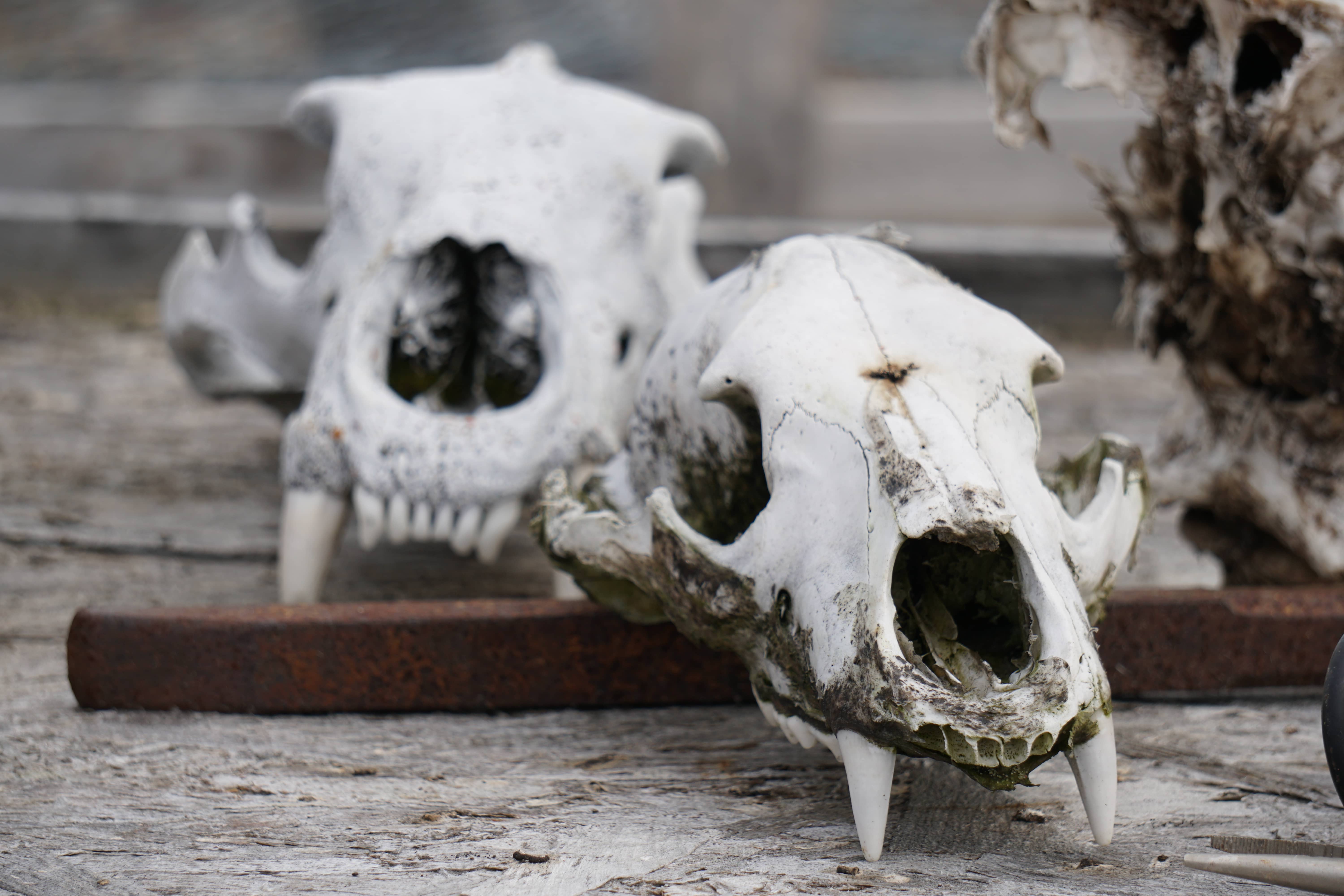
It instead unsettles fixed ideas about “knowledge” towards a “coming to know”, and instead of “knowledge integration” it performs the idea of “worldly encounters”.
This cut centers the unfolding of a particular research project: ‘Bearwatch: Monitoring Impacts of Arctic Climate Change using Polar Bears, Genomics and Traditional Ecological Knowledge’.
Hereafter referred to as "Bearwatch."
"Keep going" to learn moreThe BearWatch Project[edit]
The BearWatch project ran between 2015 and 2023, during which it sought to meaningfully engage IQ in its development of a new non-invasive genomic polar bear monitoring toolkit.
Transdisciplinary Threading[edit]
The paths you will navigate alongside this project, interweave and correspond with that of mine, and with those of researchers and policymakers in the field of polar bear science, with polar bears themselves, community members, ice-pressure ridges, snowdrifts, silly hats and many more...
But before you set on your way, notice that you have stumbled upon a "Vista".
This "Vista" is a viewpoint. Go check it out!Decision-making[edit]
You now have a choice to make.
Will you trace the most straightforward path along the reports of BearWatch project? Or will you start threading your own path as you feel your way forward in response to the company you may encounter along the way?
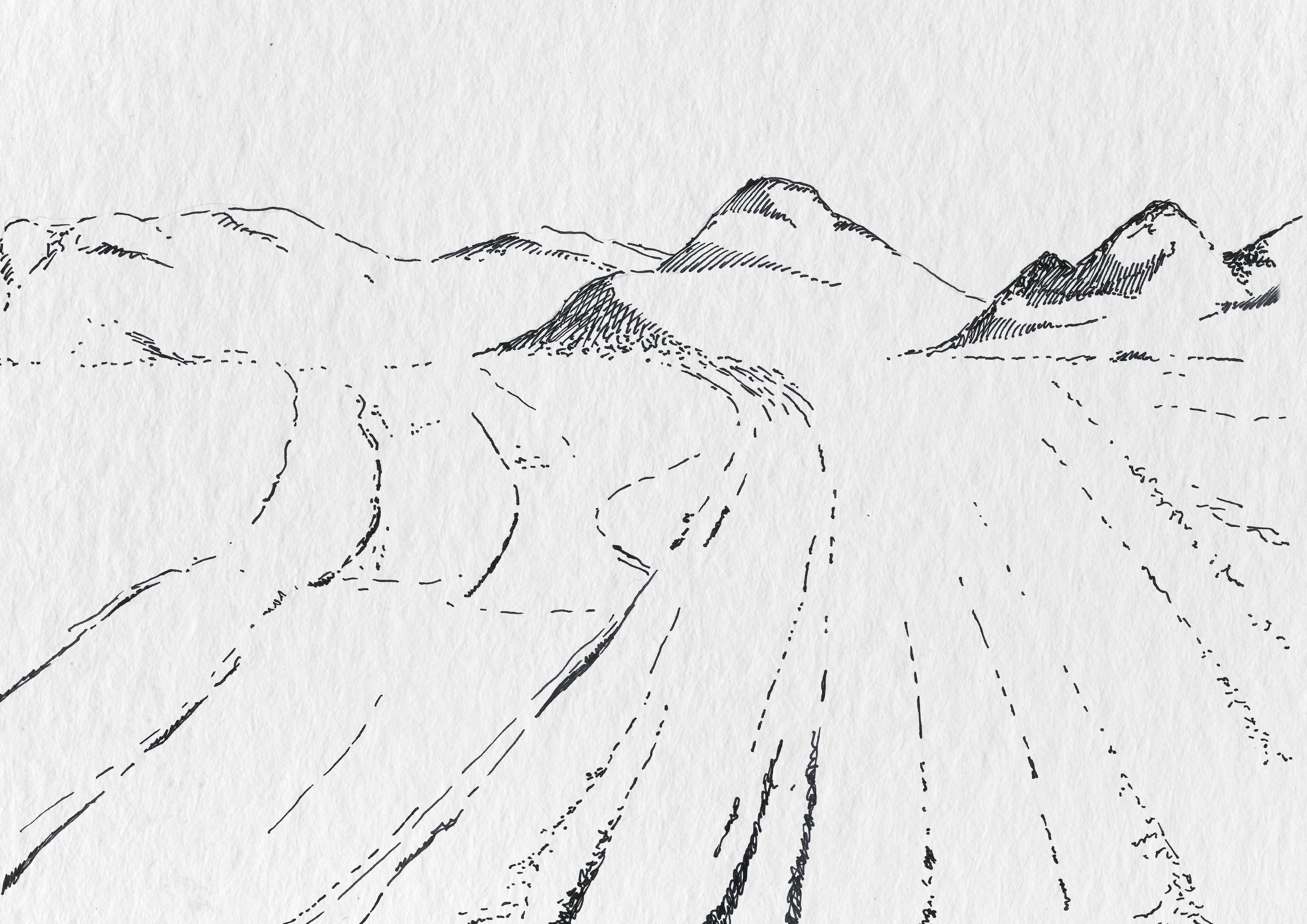
Otherwise,
Take a "Detour" to look up the meaning of “intra” dependency, as opposed to “interdependency” before you keep going.
Or,
Detour: look up the meaning of "intra-dependency"
TEK Workshops[edit]
From here, you jump straight into the BearWatch project- beginning with the TEK workshops that were held in the community of Gjoa Haven in 2019 as to inform a feasibility study on future community-driven polar bear fecal sample collection.
The BearWatch project was designed to include a “Genomics and its Environmental, Economic, Ethical, Legal and Social aspects (GE3LS)” component
Three TEK mapping workshops were co-designed with the HTA of Gjoa Haven, as part of the projects GE3LS strategy to ‘identify TEK gaps’ and ‘fill them’[1].
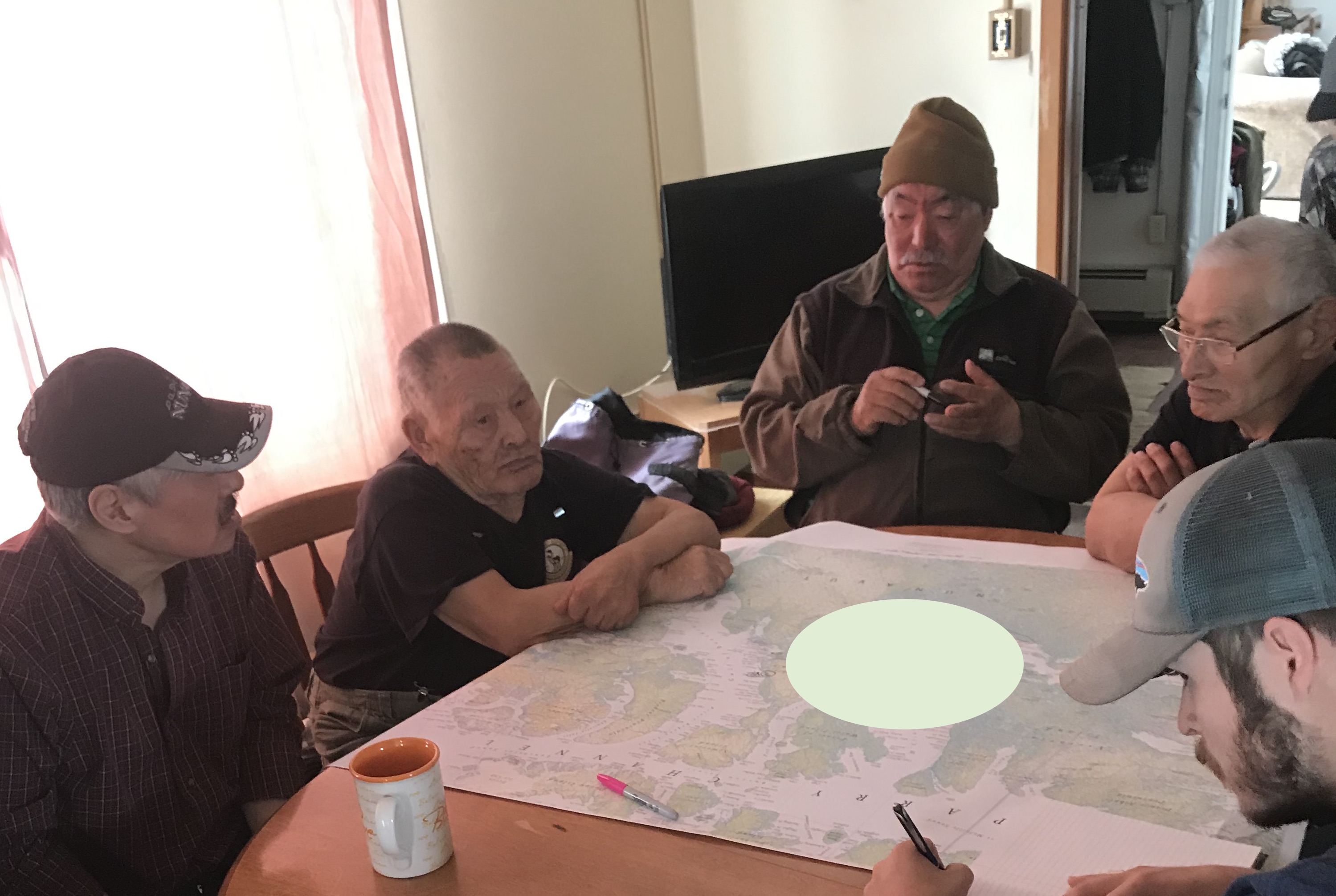
Then someone brings up the existence of a nearby shipwreck: "Knowledge Co-production”. They suggest you go check it out to get a deeper understanding of the im/possibilities around bringing IQ together with western sciences.
You weigh your options,
"Keep going" to move on with the project.
Or,
"Detour", to read about GE3LS.
Or,
- ↑ BearWatch research proposal, 2016 p.30-31
Wrecksite: Knowledge Co-production
Workshops Summer 2019[edit]
The Gjoa Haven Hunters and Trappers Association (HTA) doesn't want to "keep going," however.
They have urgently been trying to get the BearWatch researchers to turn their focus towards the available polar bear harvest quota.
After two generations of hardly being able to hunt polar bears, the Gjoa Haven HTA have asked the researchers of the BearWatch project to help them seek recognition for the loss of income, loss of culture, and loss of intergenerational knowledge transfer.
Going on the Record[edit]
Two workshops were organized in response to community requests, to record the impacts of polar bear hunting quota reductions on the community.
One workshop was held May 15, 2019 in the evening with 10 participants and one on May 16 in the morning with 11 participants.
Both workshops were audio-recorded.
The BearWatch PI's and Gjoa Haven HTA-board want to use these recordings as primary materials for an academic paper.
They ask me to write it. However, I have just learnt about this project and have not yet set foot into the community.
What would you do?
"Stay with the Trouble" to explore how the “Politics of recognition” can complicate such writing- even if it risks completely derailing you from your course.
Or,
"Keep going" to not engage further with the community of Gjoa Haven for now, and prepare for your first fieldtrip to the North- to Coral Harbour.
(The Gjoa Haven HTA wants a publication, so maybe there is no need to complicate things further for the moment?)
Stay with the trouble: The Politics of Recognition
Coral Harbour First Trip 2020[edit]
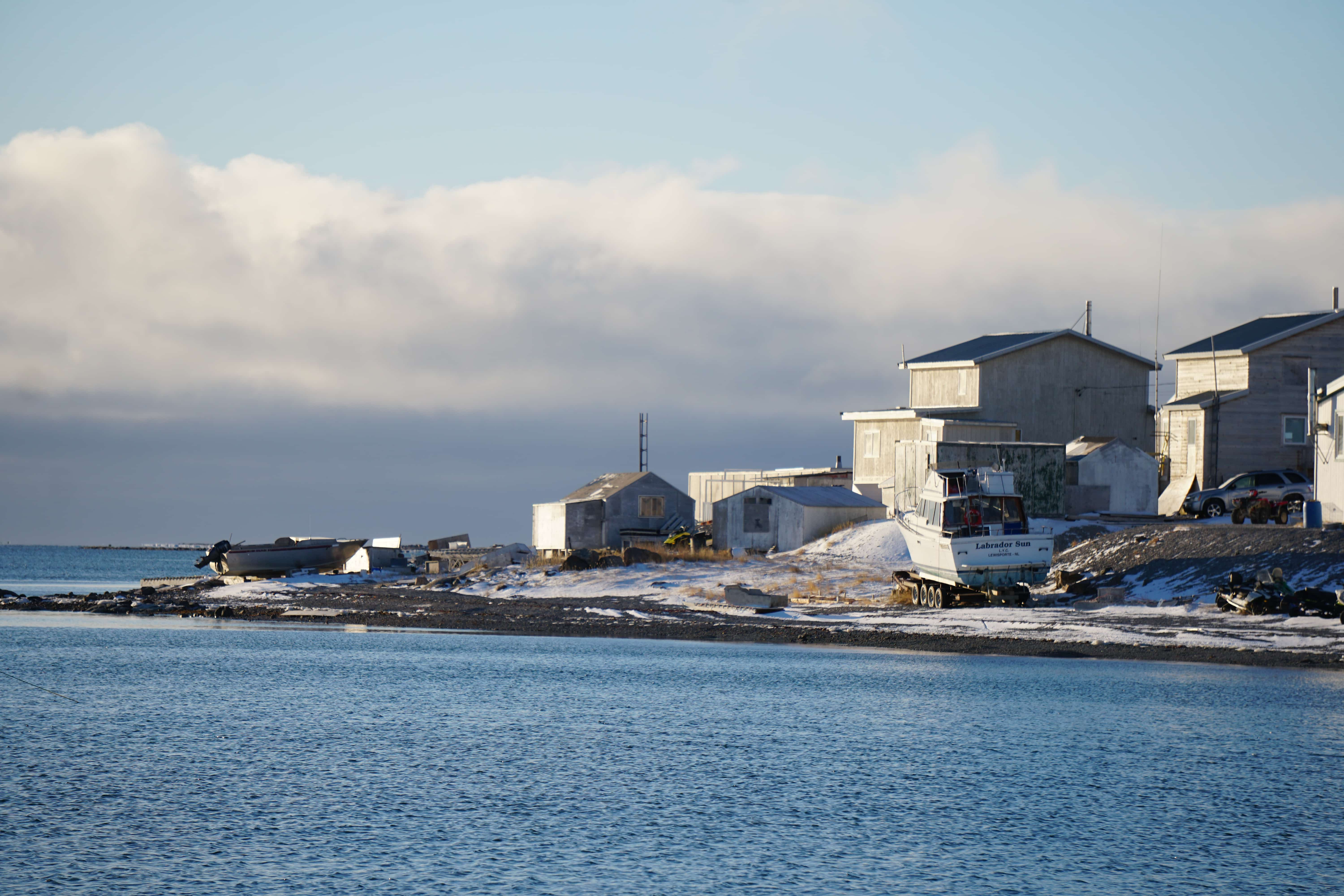
Alongside funding from Genome Canada, the project PI’s also successfully applied to the Crown-Indigenous Relations and Northern Affairs Canada/ World Wildlife Fund to fund ‘traditional knowledge research and a denning survey in Coral Harbour, Nunavut’ (Schedule H, 2020, March 31. This intended study included documenting polar bear TEK in Coral Harbour, surveys of vacated dens by locals to collect a variety of samples and data, and the initiation of a collaborative effort with the high school to train students in land-based surveys.
